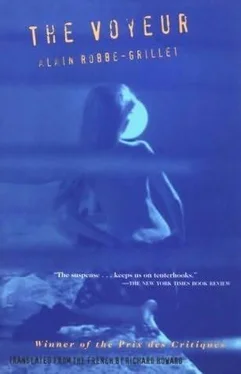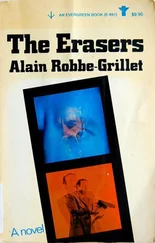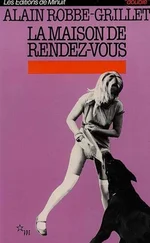Without wiping his hands he seized his suitcase, mounted the bicycle again, and tried to pedal. The chain sprang away from the sprocket-wheel.
He put it back a second time, then a third. He tried it on all three gear-wheels, without managing to make it hold on any: it came off at the first revolution. Giving up, he continued on foot, half-running, half-walking, holding the suitcase in his left hand and with his right pushing the bicycle.
An essential piece of the machinery must have been broken during the jolting on the bad road from Horses Point.
Mathias had just begun walking down the slope to town when he suddenly realized he might be able to coast down without using the pedals. He got back on the bicycle and impelled himself forward with a vigorous kick. For balance he pressed the hand carrying the suitcase against the left grip of the handlebars.
Now he had to be careful not to disturb the chain which he had put back around the sprocket-wheel—therefore he must not move his feet, or he would make it spring off again and tangle with the rear-wheel spokes. In order to fasten the chain more firmly to the sprocket-wheel, since it no longer had to revolve, the salesman thought of attaching it with a piece of cord he had picked up that morning; he began looking for the cord in the pockets of his duffle coat. But not finding it in either one, he remembered…. He remembered that he no longer had it.
Furthermore, he had arrived without mishap at the level section of the road just before the fork; he was forced to stop in order to avoid a little girl who was heedlessly crossing just in front of him. In order to gain momentum he unthinkingly gave the pedals a turn… then several more. The bicycle was working perfectly. The peculiar noise had entirely disappeared.
At the other end of the town he heard the little steamer’s whistle: once, twice, three times.
He entered the square, the town hall on his left. The whistle blew again, shrill and prolonged.
On the movie bulletin-board, the advertisement had been changed. He leaned the bicycle against it and dashed into the café-tobacco shop. No one was there: no customer in the room, no proprietor behind the counter. He called. No one answered.
Outside there was no one either, no one in sight, Mathias remembered that the man had returned his security. The sum amounted to…
The ship’s whistle blew a long blast—in a slightly lower tone.
The salesman jumped onto the bicycle. He would leave it at the end of the quay—would hand it to someone—with the amount he owed for its rental. But even pedaling as hard as he could along the uneven cobbles, he managed to remember that the garageman had still not told him the terms. At first it had only been a question of the two-hundred-crowns security, which obviously bore no relation to the value of the bicycle nor to the cost of a half-day’s rental.
Mathias decided not to try riding along the pier, for it was encumbered with a great many baskets and hampers. There was not a single stroller on this part of the quay to take the money, so he abandoned the bicycle against the parapet and immediately ran toward the steamer. In a few seconds he had reached the landing slip, where a little crowd of about ten people was standing. The gangplank had been pulled up. The steamer was slowly pulling away from the embankment.
The tide was high now. The water covered a good part of the inclined plane—half of it, perhaps—or two-thirds. The seaweed on the bottom could no longer be seen, nor the tufts of greenish moss which made the lower stones so slippery.
Mathias looked at the narrow strip of water almost imperceptibly widening between the ship’s side and the oblique edge of the landing slip. He could not jump across it, not so much because of the distance—which was still very slight—but because of the dangers of landing on the gunwale or in the midst of the passengers and their baggage on the stem deck. The downward slope along which he would have to run to gain momentum increased the difficulty still further, as did the heavy shoes and the duffle coat he was wearing, not to mention the suitcase he was carrying.
He looked at the half-turned backs of the people staying behind, their faces in profile, their stares motionless and parallel—meeting identical stares from the ship. Standing against an iron pillar that supported the deck above, a child of seven or eight was gravely staring at him with large, calm eyes. He wondered why she was looking at him that way, but then something—a silhouette—came between him and the image—a sailor on board whom the salesman thought he recognized. He ran forward three steps toward the end of the pier and shouted: “Hey there!”
The sailor did not hear him over the noise of the engines. On the pier Mathias’ immediate neighbors turned toward him—then others farther away, by degrees.
The passengers, noticing the general movement of heads on the pier, also looked in his direction—as if in astonishment. The sailor raised his eyes and caught sight of Mathias, who waved his arms in his direction and cried again: “Hey there!”
“Hey!” answered the sailor waving his arms in farewell. The little girl next to him had not moved, but the maneuver executed by the ship changed the direction of her gaze: now she would be looking at the top of the pier, above the landing slip, where another group of people was standing on the narrow passageway that led to the beacon light. These too were now facing Mathias. All of them had the same strained, frozen expression as before.
Without addressing anyone in particular, Mathias said: “I didn’t miss it by much.”
The little steamer executed its usual maneuver, which consisted of turning so that it presented its stem to the open sea. The islanders left the end of the pier one after the other to return to their houses. The salesman wondered where he would sleep that night, and the next, and the one after that too—for the boat would not return until Friday. He also wondered if there were any policemen on the island. Then he decided it wouldn’t change matters, whether there were or not.
In any case, it would have been better if he had left, since that had been his plan.
“You should have shouted! They would have come back.”
Mathias turned toward the person who had spoken these words. It was an old man in city clothes whose smile might have been kindly as well as ironic.
“Bah!” answered Mathias. “It doesn’t matter.”
Besides, he had shouted—not right away, it was true—and not very insistently. The sailor had not seemed to understand that he had just missed the boat. He did not know why he had shouted himself.
“They would have come back,” the old man repeated. “At high tide they can tum easily.”
Perhaps he wasn’t joking. “I didn’t have to go,” said the salesman.
Besides, he had to take back the bicycle and pay for its rental. He looked at the water lapping against the foot of the embankment—slack tide probably. In the sheltered angle of the landing slip, the backwash produced scarcely any swell at all.
Then came a series of little waves from the steamer’s propeller. But the harbor was empty. Only a fishing-smack was dancing out in the middle somewhere, its mast waving to and fro. Since he risked getting spattered on the landing slip, Mathias walked up the slope and found himself again on top of the pier, walking alone among the baskets, nets, and traps.
He put his right hand—the free one—in the pocket of his duffle coat. It came into contact with the slender cord rolled into a figure eight—a fine piece for his collection. He had often heard the story before: once he had had a whole boxful—perhaps twenty-five or thirty years ago.
He did not remember what had become of them. The slender cord picked up that morning had also disappeared from his duffle coat pocket. His right hand encountered only a pack of cigarettes and a little bag of gumdrops.
Читать дальше












